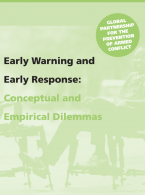
Early Warning and Early Response: Conceptual and Empirical Dilemmas
Whereas a rich literature exists on how early warning/ response should be carried out, very little is known about how early warning actually happens, especially in field-based systems. Consequently there is some scepticism about the entire concept of early warning among outsiders. The primary conceptual challenges revolve around the central issue that the added value of early warning is still unproven. This is due to two facts: that predictions have not been accurate in the past (or important events were not foreseen), and that operational responses have been inadequately linked to warnings. Moreover, early warning methods have not demonstrated how they can engage with current high- profile threats, i.e. organised crime, drugs or terrorism.
From a civil society perspective, early warning/ response presents a number of challenges. Firstly, attracting attention to low-profile conflicts is problematic. Secondly, shifting from macro-level political early warning to micro citizen-based warning and response systems has been too slow. Thirdly, civil society organisations at times find themselves in a position of both ‘warners’ and implementers of response measures which can create tensions and pose questions with regards to the legitimacy of their mandates.


